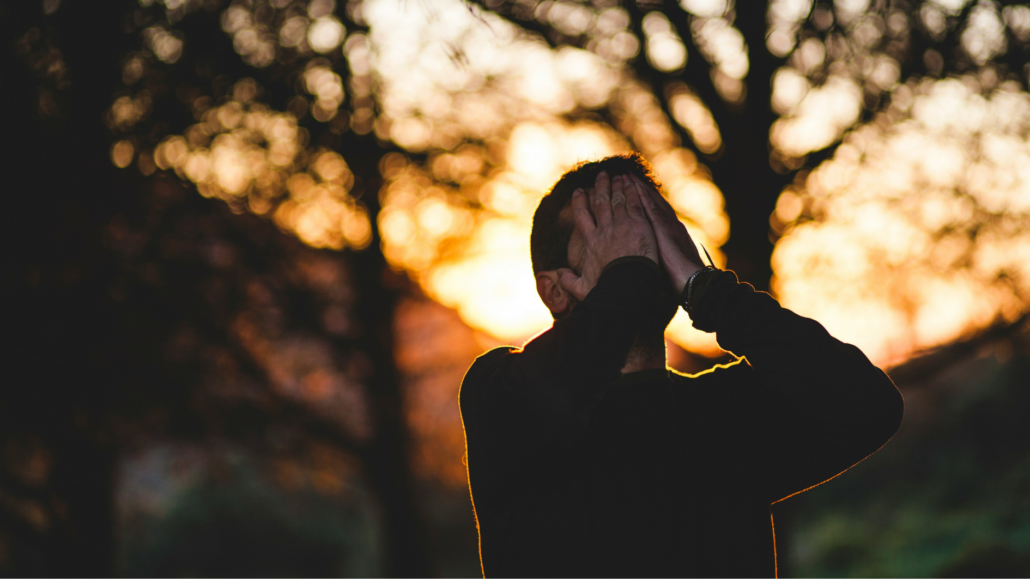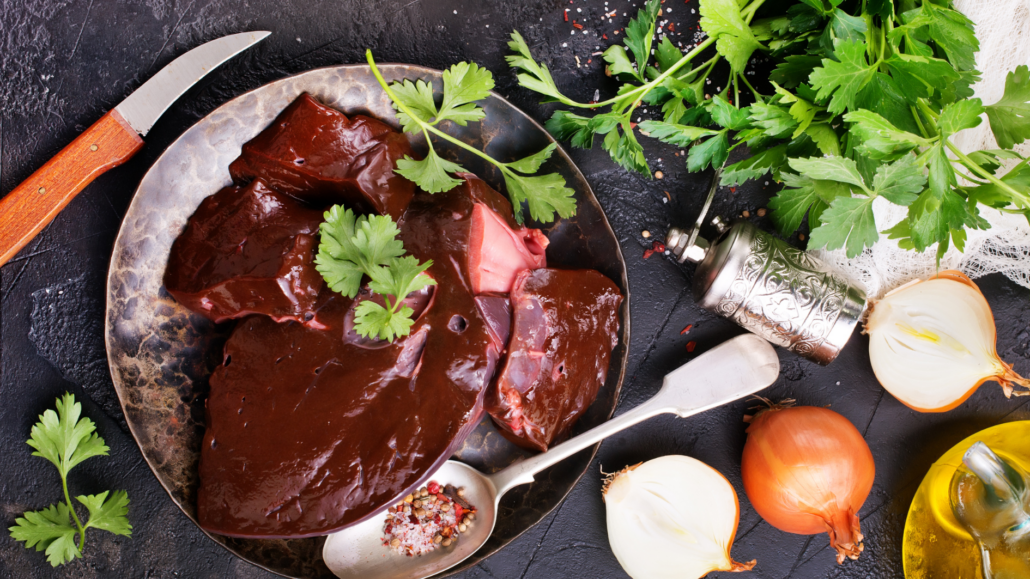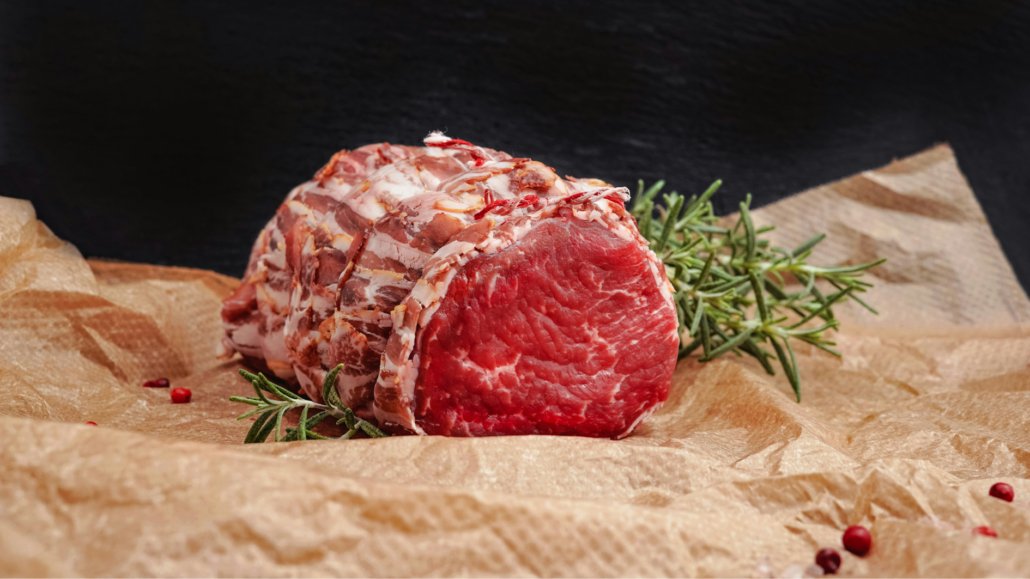We include products in articles we think are useful for our readers. If you buy products or services through links on our website, we may earn a small commission.
What Happens if you Don’t Eat Enough Fat on Keto?
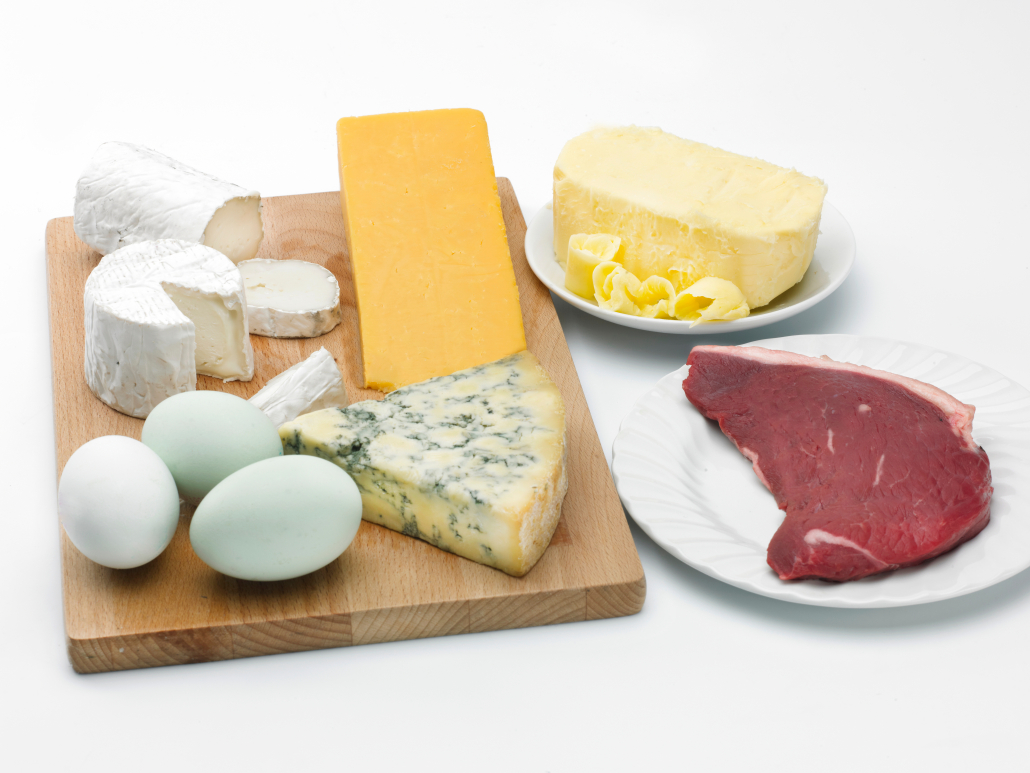
Table of Contents
The ketogenic diet is above all a high-fat low-carb way of eating. Yet because of decades of nutritional misinformation, there is a cultural fear of fatty foods. Our fear of fat can make it hard for people to truly adopt a ketogenic and carnivore way of eating. It’s often the case that people who go keto end up eating too little fat and too much protein, leaving many to wonder what happens if you don’t eat enough fat on keto?
Let’s take a closer look at how the fat-loving human metabolism works and what happens when you don’t eat enough fat on keto.
Not Getting Enough Fat: Fast Facts
Remember that keto means getting 70-80% of your calories from fat, and only 10-20% from protein.
When you don’t eat enough fat on keto a number of problems can arise, including:
- Chronic hunger
- Persistent carb cravings
- Protein poisoning (rabbit starvation)
- Digestive problems, including diarrhea and/or constipation
- Micronutrient deficiencies
Humans are Fat Eating Machines
To understand what happens when you don’t eat enough fat on keto, it’s important to first understand the overall role that fat plays in the human diet.
High-fat low-carb eating isn’t just a dietary fad. It’s the way of eating humans evolved for nearly 2 million years before the advent of agriculture.
In fact, from an evolutionary perspective, our ability to thrive on a high-fat diet is what makes us human. Let us explain.
Humans split from our more ape-like ancestors when we discovered how to use percussion tools to scavenge fatty bone meats and brains that other, less dextrous predators, left behind from their kills.
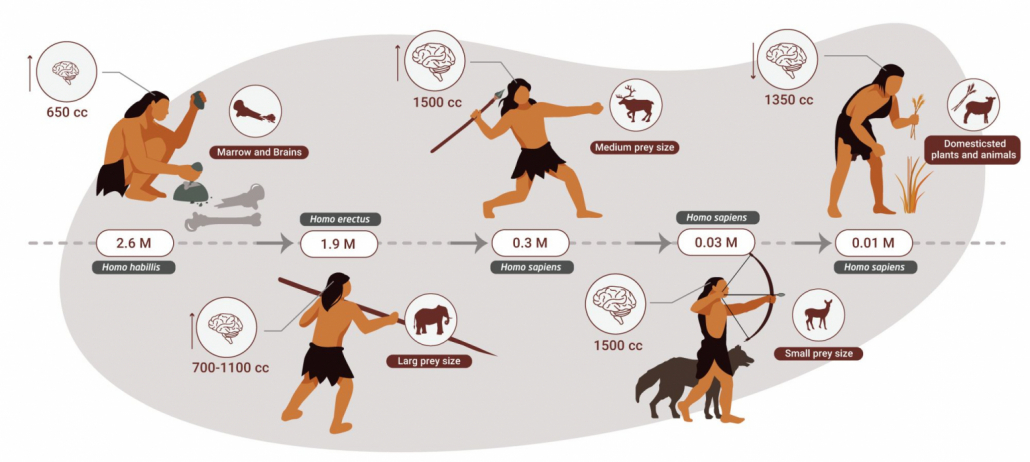
Source: Dr Miki Ben Dor
Only after we learned to feed ourselves with this unprecedented energy-rich fuel source did our brains get big enough (we got smart enough) to hunt much larger and very fat animals.
Our rapid brain growth and subsequent ability to hunt fatty animals likely resulted in the extinction of megafauna wherever humans migrated. The smaller animals that remain with us to this day were too lean to bother hunting aggressively. 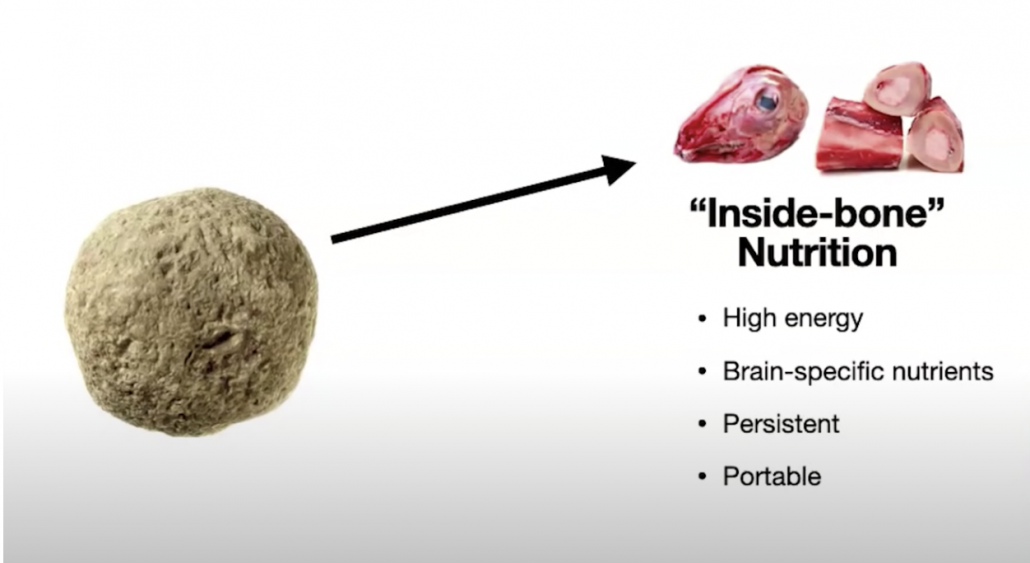
Source: Amber O’Hearn
Researchers like Miki Ben-Dor and Amber O’Hearn point out that our cavemen ancestors ate a carnivorous diet of huge, extremely fatty animals for nearly 2 million years of evolution.
The bodies of modern humans are physiologically identical to the bodies of our fat-loving ancestors, and therefore we bare a genetically inherited taste for, and ability to thrive on, fat.
In many respects, the keto diet is a way to mimic our ancestral eating habits and better attune our physiological inheritance in the modern world.
Considering how humans evolved on lots of fat, it’s accurate to say that humans are not just facultative carnivores (prioritizing meat, but getting energy from other foods when necessary), but that we are actually facultative “lipivores”. Lipid being the scientific word for fat.
Our genetic lipivorism is apparent in the way we humans:
- posses a propensity to store fat (as energy) on our bodies unique from most other mammals
- can easily enter ketosis (metabolizing fat into energy molecules) during mundane, calorically replete states, not just starvation states, which makes us, unlike other predators
- have massive energy-hungry brains that devour fat from the moment we’re born until we die
Protein Poisoning If You Don’t Eat Enough Fat on Keto
Our evolutionary disposition towards prioritizing fat is reflected in the fact that humans are constrained in our ability to get energy from protein. In other words, we can OD on protein pretty quickly, especially when compared to other carnivores.
For example, cats can get 70% of their energy needs from protein because their bodies are designed to synthesize it into glucose to feed their brains. Our human brains need us to eat more fat, and this need is amplified when we’re on keto.
When humans get more than 35%-50% of our calories from protein, we can get protein poisoning.
Getting too much protein over an extended period of time interferes with the ability of our liver to upregulate urea synthesis needed to metabolize protein.
Protein poisoning symptoms include :
- Hyperaminoacidemia
- Hyperammonemia
- hyperinsulinemia
- Nausea
- Diarrhea
- Death within 2-4 weeks of prolonged protein poisoning
Historical records from arctic explorers like Vilhjalmur Stefansson give us an example of what happens when people rely on small, lean prey and not enough fat. This is an accurate description of what happens to you if you don’t eat enough fat on keto.
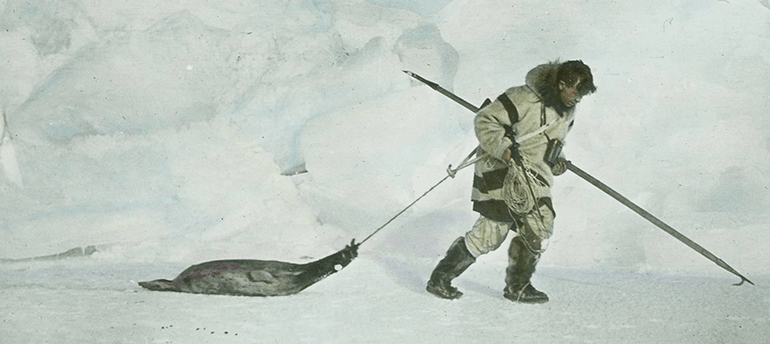
Vilhjalmur Stefansson dragging a seal back to camp. This picture was the cover photo for Stefansson’s book, “The Friendly Arctic,” published in 1921.
The fact that early humans who ate mostly meat didn’t get protein poisoning–or we wouldn’t exist–tells us that they ate mostly fatty meat.
We see this pattern among modern hunter gatherer tribes who often discard the leanest meats while prizing fat and organ meats.
Stefansson himself described how when the Inuit ate caribou, they prized the fat behind the eye and the fatty meat around the head, then the organs, including the heart, and kidneys. Caribou kidneys are around 50% fat.
Clinically Observed Protein Poisoning on Keto
After living with the Inuit and learning to thrive on a carnivore diet of mostly animal fats and organs, Stefansson wanted to demonstrate the efficacy of the diet to the disbelieving Western world.
Under observation at Bellevue hospital in New York, Stefansson and a friend ate only meat for a year.
The only time they experienced illness in when the experimenters had them eat only lean meat.
Stefansson describes not eating enough fat on his keto diet as causing, “diarrhea and a feeling of general baffling discomfort.”
Stefansson and his friend were able to quickly reverse these symptoms by eating a single fat-loaded meal of brains fried in bacon fat and sirloin steak.
This incidence of not eating enough fat on keto led Stefansson’s observers to determine that the ideal ratio of an all-meat keto diet is 3 parts fat to 1 part protein.
This is still the ideal foundation of the modern ketogenic diet.
Digestive Issues
From Stefansson’s description above, you can see that not eating enough fat in the context of a low-carb diet manifests most obviously in issues with digestion.
Some of the most common keto side effects reported by people making the transition to keto are nausea, keto diarrhea, and keto constipation.
Though it can take some time for the body to produce more bile and enzymes needed to metabolize a higher fat intake, often these side effects result from people simply not eating enough fat on keto.
Micronutrient Deficiencies
Fat-soluble vitamins A, D, E, and the special meat-specific vitamin K2 are among the most important nutrients for maintaining vital body functions including our immune system, hormone signaling, and gut health.
Vitamin A and vitamin D are fat-soluble vitamins that directly regulate bile acid production–which is needed for metabolizing the high fat intake of a keto diet.
When eating keto you get these vitamins in the form of fatty keto meat, specifically in the healthy saturated fats.
Deficiencies in vitamins A and D are extremely common. One study found that 80% of participants with IBS, and over 30% of healthy participants were deficient in vitamin D.
Many people who go keto do so in order to treat digestive disorders like IBS, so it’s likely that they are already deficient in these key fat soluble vitamins.
If you don’t eat enough fat on keto you can exasperate vitamin deficiencies that can make it harder to properly metabolize fat, causing a more difficult transition period.
Fatty pork from pasture-raised animals is especially high in vitamin D. This matters because over 90% of Americans are deficient in vitamin D, and around 80% of people hospitalized with COVID are vitamin D deficient [10].
Carb Addiction and Chronic Hunger
The standard American diet is inundated with carbs from processed grains and added sugar.
Carbs have been shown to activate neurotransmitters and the brain’s reward centers in similar ways to other addictive substances like alcohol and cocaine.5
Addiction to carbs can lead to serious metabolic issues, including:
- Diabetes
- Infertility
- heart disease
- various cancers
The good news is that fat consumed separately from carbohydrates is not shown to be addictive. On the contrary, fat is satiating, meaning that it makes us feel fuller longer, and thereby reduces food cravings.
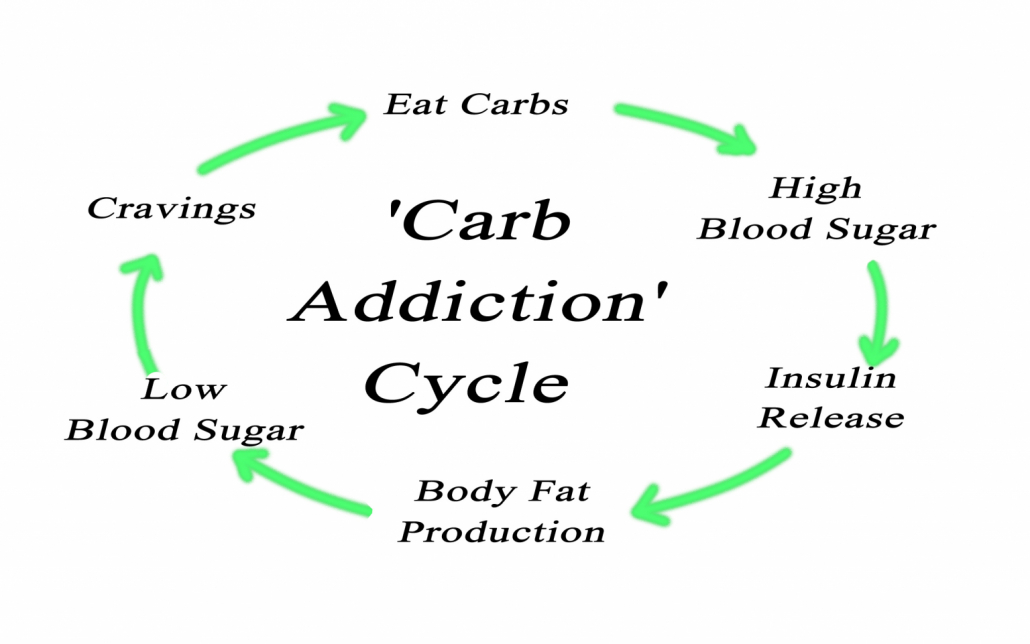
When you don’t eat enough fat on keto, you deprive your body and your habituated brain of sugar, but you don’t replace those calories with the satiating benefits of fat. This can lead to strong carb cravings that make you more likely to binge on highly processed and carb-loaded junk food.
What Happens if You Don’t Eat Enough Fat on Keto? The Bottomline
Keto is a high-fat low-carb diet. But in our modern world, most of us are recovering from outdated low-fat guidelines. This makes us suspicious of fat, which is the single greatest obstacle to starting and maintaining a keto diet.
When you don’t eat enough fat on keto you deprive yourself of the most important nutrient in the human diet. When reducing carbs, insufficient fat can lead to potentially serious problems that arise from overreliance on protein.
Our bodies have an upper limit on the amount of energy we can derive from protein–between 35-50% of our caloric intake. Going beyond this will result in protein poisoning.
Too much protein and not enough fat causes numerous digestive problems, including diarrhea, bloating, and constipation.
Not eating enough fat on keto also deprives your body of a highly satiating nutrients, and may prolong and amplify carb cravings, especially when just starting out on keto.











